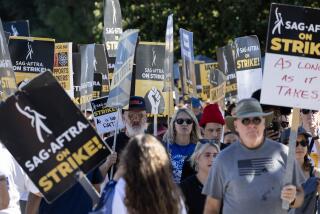WGA, divide and conquer
While The Times’ editorial last week took a reasoned look at the status of the writers strike, the view was far too limited. Indeed, it’s worth noting that the impact of the strike is not “lamentable” it’s horrifying. There’s $500 million lost already, and people painfully hurt. That’s ghastly. All the while the Assn. of Motion Picture and Television Producers has walked away from the table, and instead negotiated with a guild not on strike. Go figure.
The opening sentence gives the sense of The Times’ limited focus describing the editorial board’s “impression” of writer morale on the picket line. The only way to truly understand morale on a picket line is to actually be on the picket line. For three hours a day, every day. Not by observing a coffee shop. I’m often asked “How is the strike going?” Well, no strike is going well you’re on strike. It’s horrible. And should be. Yet the attitude on the writers’ line is utterly remarkable. It’s deep anger at the shameful offers of zero from the AMPTP corporations which would destroy the Writers Guild of America, and then the Screen Actors Guild and ultimately the film industry, and studios themselves. That’s what zero does. And there’s great anger at the corporations callously walking away during a strike twice.
But when you genuinely understand you’re striking for your existence and your industry’s, morale can only be filled with honor. Because AMPTP actions have opened writers’ eyes wide to controlling their own work on new media, picketing writers enthusiastically meet with venture capitalists and online media companies, already working for the future. All it takes are open eyes to see the throngs of writers still picketing all day, every day at studios around town. Writers are not known for walking. Or being outdoors. Or interacting with other sentient beings. You must understand how profound those long picket lines are, and what they truly mean about the high morale that exists.
Further, The Times oddly questions guild efforts to actually get members back to work which gets others back, as well. There is no single way to resolve a strike. One way is, indeed, a financial impact on the studios and networks. But whatever income companies derive from a handful of deals, that’s peanuts to the billions lost. The Times says, “The math of a strike is so simple even English majors can grasp it: If money is changing hands, that’s bad for the strikers.” The reasoning of that is remarkably short-sighted. The Times itself calls that money “chump change.” Chump change by definition is meaningless. Wise people understand that sometimes you spend money to make money. Likewise, sometimes you have to let one side make money for a larger personal gain.
That’s because far more important than chump change in a strike is something the AMPTP is adept at and which writers (and actors, bless them) have finally been able to do, too: divide and conquer. We see it from the AMPTP in their attacks on guild leadership and rumors floated to bloggers. But the pipeline flows two ways.
Giving a few companies a small revenue stream puts huge pressure on competitors not getting that same revenue. Giving individual companies access to guild writers puts pressure on other studios seeing their competition leap ahead of them. Every night on those talk shows which have been caught in the unfortunate vise of their parent corporations, we hear their hosts almost pleading on national television to get a WGA contract. Almost daily come angst-ridden cries from networks about why SAG is allowed to get a waiver for its awards and others don’t. (Hint: because SAG is nobly supporting writers. Thanks!) And more, there’s the public benefit of making separate deals to show that what you’re asking for is actually reasonable. It takes many strategies during a strike, not merely cutting off revenue. And so, earlier this month, we saw Les Moonves of CBS expressing hope that “talks begin shortly.” And then yesterday, we saw the AMPTP finally offer the Directors Guild of America terms they could have offered writers a month ago, yet likely would never have been made to directors without such varied pressure.
In the end, this is why you allow “chump change.” Because it’s one part of a multifaceted effort, because it helps cause growing dissension within the AMPTP.
Does anyone truly believe most companies in the AMPTP aren’t furious at the gang rule of seven? (Or probably just three.) That’s what you get when you have a monopoly and media consolidation. Comedy Central would sign an agreement today except that it’s owned by Viacom. If The Times wants to see low morale, it should head over to the AMPTP lunchroom and talk to morose executives from the hundreds of companies aching to sign a sensible deal and get back to work.
The Times says, “let’s be honest: Strike is war.” No. Let’s really be honest. It’s not. It’s only like war. Iraq, that’s war. Strike is a serious, painful battle. Unfortunately, they’re both close to hell.
Robert J. Elisberg is a screenwriter in West Los Angeles and a commentator for the Huffington Post who has written for the Los Angeles Daily News, Los Angeles Magazine, C/NET, E! Online and others. He served on the editorial board for the Writers Guild of America West, helped created the WGA.org website and writes a technology column for the Writers Guild East.
More to Read
A cure for the common opinion
Get thought-provoking perspectives with our weekly newsletter.
You may occasionally receive promotional content from the Los Angeles Times.










